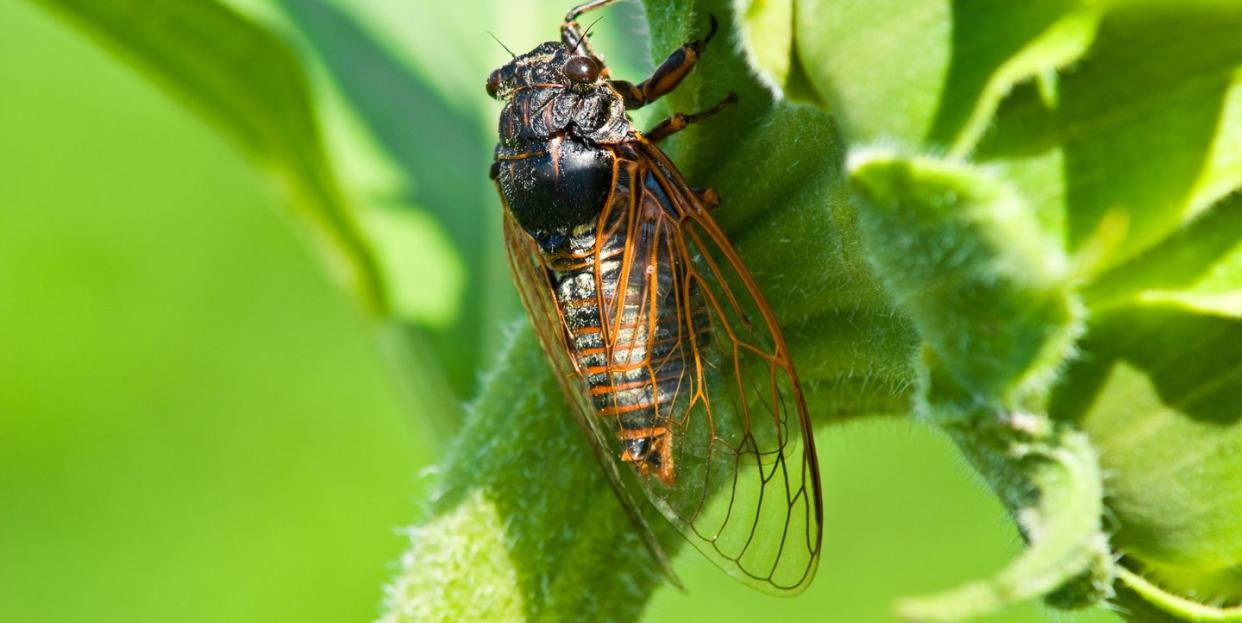Why Are Cicadas So Noisy? Here’s the Science Behind Their Deafening Buzz

Among the many sounds of summer, there’s one that’s completely undeniable: cicadas. The collective buzzing and clicking is a bit hard to miss. And this year, they’ll be deafening as millions of cicadas come out to play after spending 17 years underground.
That’s right: Millions of periodical cicadas from Brood X will emerge in at least 15 different states, mostly on the east coast, according to Godfrey Nalyanya, Ph.D., an associate certified entomologist with Ehrlich Pest Control. This spectacular phenomenon hasn’t taken place in these areas since roughly 2004. This year, they’ll pop out from the soil for about four to six weeks to mate before dying off and resurfacing once again in 2038.
If you aren’t familiar with periodical cicadas, they’re very unique insects. Depending on the cicada species, they will either reappear every year or periodically (every 13 or 17 years). Nymphs (immature cicadas) live in the soil, feed on roots, and only come out as mature adults in a synchronized show to breed and lay eggs.
Why? That’s “one of the great mysteries of the insect world,” per a 2020 statement from Virginia Tech’s Department of Entomology, which addressed last year’s Brood IX emergence. Scientists believe it may be a way for nymphs to avoid predators. But when they do come out, you won’t miss it—these bulgy-eyed insects are loud.
What kind of sound do cicadas make and why are they so noisy?
Cicada sounds have been described in various ways. In general, though, “cicadas create a high-pitched buzzing sound,” says Angela Tucker, Ph.D., a board-certified entomologist and technical manager at Terminix.
The U.S. Department of Health & Human Services maintains that they can reach at least 90 decibels, which is “as loud as a lawn mower, dirt bike, or tractor” and has been likened to “the whining of electrical wires rising and falling.” For one annual species in the Midwest, “the song sounds like someone is pressing scissors against a grind wheel in rapid succession,” per Iowa State University.
But why are they so noisy? It depends on the species, but cicadas “sing” as a way to communicate, reproduce, and maybe even defend themselves, according to the University of Florida’s Book of Insect Records. Cicadas mostly make noise in the evening around dusk, but will also buzz at you if you pick one up. “They will make sound when they are disturbed,” Tucker says.
In general, the sounds you hear from periodical cicadas are a mating call. Like many flashy gestures in the animal world, it’s a male cicada’s way of trying to lure in a lady. Males have a special structure on their abdomen called a tymbal, which “contains a series of ribs that buckle one after the other when the cicada flexes its muscles,” Chicago’s Peggy Notebaert Nature Museum explains. “Every time a rib buckles, the rib produces a click. Many clicks produce a buzzing sound.”
Are cicadas harmful?
Cicadas can be a noise nuisance, but they’re absolutely harmless to both humans and pets, as they don’t bite or sting. Although, during an emergence, you’ll likely see empty shells littered around tree trunks and other structures as the nymphs molt.
After they breed, cicadas actually use a sharp tube to inject their eggs into branches and vines of trees, which can cause quite a bit of damage for anyone who manages an orchard or vineyard, or simply grows trees on their property. “Cicadas can occur in overwhelming numbers and growers in predicted areas of activity should be watchful,” professor and entomologist Doug Pfeiffer, Ph.D. explained in Virginia Tech’s statement.
Beyond that, he says “this insect is really fascinating, and if you don’t have fruit trees or grapevines to protect, you can enjoy this phenomenon while it lasts.”
Additional reporting by Korin Miller
Go here to join Prevention Premium (our best value, all-access plan), subscribe to the magazine, or get digital-only access.
You Might Also Like

